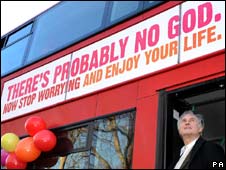I know, I'm two weeks late to be commenting on this... but I've been on holiday.
The recent advertising campaign, bankrolled by the British Humanist Association, and backed by Richard Dawkins, has received a lot of publicity.

I'm not going to debate the probability or not for God's existence. I'm not going to comment on the need to define what we mean by the term "God" before we can debate whether or not he exists. Those would all be interesting avenues to explore. Today, I'm more interested in the second half of the slogan. What's notable is the honesty of it.
When trying to work out whether or not someone committed a crime, one factor is whether they had a motive for doing so. Now, suppose there is a God, but the humanists wish to believe that there is no such person in spite of the evidence. Such a scenario is conceivable, but would they have any motive for deceiving themselves and others in such a way?
Well let's listen to them in their own words. They want to advise us that “There's probably no God. Now stop worrying and enjoy your life.” There's the motive. If there is a God, or if you have a niggling suspicion that there might be, then you become accountable. Knowing that you are accountable will stop you enjoying yourself. So if you can convince yourself that there is no God, you can enjoy yourself. Convenient.
At this point it's worth replying to them in two ways. (I know, I'm about to do the things I said I wouldn't do a moment ago).
First, could they do no better than assure us that there is probably no God? That's not enough to remove that niggling worry. For that, we need to know that there is definitely no God. Otherwise, Pascal's wager kicks in, and the risks of recklessness outweigh the enjoyment. Yet they are not confident enough to announce to the world that there is definitely no God. This means we are being misled. We are being fed a statement which purports to tell us we can abandon ourselves to hedonism, but which is not a strong enough statement to give us that “liberty”. I'm not arguing that "There's probably no God" is false. I'm arguing that, even if true, it would not follow that we can “stop worrying and enjoy … life”. So we are being misled. We are being invited to accept their proposition (probably no God) because of the benefits to us (freedom from worry and freedom for enjoyment), when the proposition does not deliver the benefits.
Second, when they say there is no “God” they clearly don't mean the same thing by “God” that I do. The Father of our Lord Jesus Christ is the one from whom every good and perfect gift comes. So his non-existence would be grounds for the non-existence of all those things we most enjoy. The premise that the existence of God removes enjoyment and replaces it with worry only holds if the God we are talking about is a different one from the one revealed by Jesus. But I don't propose to abandon God, when knowledge of him is life in all its fullness. If people abandon faith in God, they may find (temporary) enjoyment. However, their enjoyment still comes from the God they deny, even though they deny him. The fear should be in case the God they deny one day denies them - for then enjoyment will be banished.
So I'm relieved that they put the full slogan on the buses. “There's probably no God. Now stop worrying and enjoy your life”. If they'd just put “There's probably no God” they might have managed to unsettle a few. But instead they've chosen to show their full hand - including motives, non-sequiturs, and the straw-man of the God they try to deny. That makes the whole slogan much less seductive.ldquo;Gods listen to them in their own words. They want to advise us that
Apparently it was the Advertising Standards Agency who encouraged/insisted that they put "probably" in the statement, because otherwise it would fall foul of advertising regulations on proof!